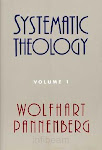This is an essay on the nature of doctrine. References are to Jaroslav Pelikan’s monographs on the development of Christian doctrine. Reference (3:241) would refer to volume 3, page 241.
1. Doctrine is “important”
2. Doctrine and mystery
3. The inadequacy of doctrine
4. The inevitability of doctrine
5. The scope of doctrine
6. “Hierarchies” of doctrine
7. The relation of words and reality
8. Liturgy as the fulfillment of doctrine
9. Love as the fulfillment of doctrine
-- -- --
Doctrine is “Important”
“The Christian life must begin first of all with doctrine, from which faith flows,” wrote the Anabaptist theologian Balthasar Hubmaier (4:4), and most Reformers would have agreed. Henrich Bullinger, the German-Swiss Reformer, stated his axiom: “Doctrine is the most important thing, which stands out above all others” (4:4). Luther went so far as to say that some doctrines, foremost the sacraments, were so vital that whoever erred on them, “in even one point,” was to be avoided (4:178).
The Catholics and Orthodox of course agreed on this primacy of doctrine. It was pointed out at the Council of Trent that for the Protestant Reformers, too, the primary concern was the (supposed) “wrong teaching” of the church, from which the “wrong conduct” proceeded (4:247). In stressing the importance of, say, sacramental doctrine, the Catholics could be at least as adamant as Protestants (4:293).
John Henry Newman admitted that “from the age of fifteen, dogma has been the fundamental principle of my religion; I know no other religion; I cannot enter into the idea of any other sort of religion”; and he had never had any serious “temptation to be less zealous for the great dogmas of the faith” (5:267).
Clearly, then, doctrine (or dogma, as I will use these two interchangeably) is and has always been supremely important.
In this article I will not trace the development of this or that specific doctrine, but rather concentrate on “doctrine” itself and seek to better understand its significance. Where lays its importance? Individual dogmas shall come into play only in reference to this broader question. Doctrine is defined as “what the church believes, teaches, and confesses on the basis of the Word of God” (1:1).
The central theme of this essay, as stated in the title, is “the inadequacy and inevitability” of doctrine, its inherent limits and proper scope respectively.
In order to do justice to such a broad theme I shall have to consider doctrine from various angles: doctrine’s relation to mystery; what exactly constitutes the limits and proper scope of doctrine; doctrine as a “map”; the possible “hierarchies” of doctrine; and its fuller “comprehension” and fulfillment in faith, and – primarily – in worshipful liturgy and in love in action.
Throughout the article the reader will be asked to keep in mind the question (which is entertained in this series but ultimately not answered): What is the relationship of dogmatic formulations and the reality they seek to formulate? In what way can it be said that dogma “reaches” or “conveys” the reality it seeks to articulate?
2 years ago







No comments:
Post a Comment